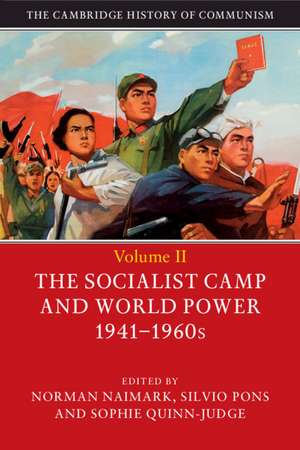The Cambridge History of Communism: The Cambridge History of Communism
Editat de Norman Naimark, Silvio Pons, Sophie Quinn-Judgeen Limba Engleză Paperback – 22 apr 2020
| Toate formatele și edițiile | Preț | Express |
|---|---|---|
| Paperback (1) | 273.85 lei 3-5 săpt. | +50.58 lei 7-13 zile |
| Cambridge University Press – 22 apr 2020 | 273.85 lei 3-5 săpt. | +50.58 lei 7-13 zile |
| Hardback (1) | 1040.33 lei 3-5 săpt. | |
| Cambridge University Press – 20 sep 2017 | 1040.33 lei 3-5 săpt. |
Preț: 273.85 lei
Nou
Puncte Express: 411
Preț estimativ în valută:
52.41€ • 54.51$ • 43.92£
52.41€ • 54.51$ • 43.92£
Carte disponibilă
Livrare economică 20 februarie-06 martie
Livrare express 06-12 februarie pentru 60.57 lei
Preluare comenzi: 021 569.72.76
Specificații
ISBN-13: 9781107590014
ISBN-10: 1107590019
Pagini: 700
Dimensiuni: 153 x 228 x 33 mm
Greutate: 1.18 kg
Editura: Cambridge University Press
Colecția Cambridge University Press
Seria The Cambridge History of Communism
Locul publicării:New York, United States
ISBN-10: 1107590019
Pagini: 700
Dimensiuni: 153 x 228 x 33 mm
Greutate: 1.18 kg
Editura: Cambridge University Press
Colecția Cambridge University Press
Seria The Cambridge History of Communism
Locul publicării:New York, United States
Cuprins
Introduction Norman Naimark, Silvio Pons and Sophie Quinn-Judge; Part I. Expansion and Conflict: 1. World War II, Soviet power and international communism Evan Mawdsley; 2. Anti-fascist resistance movements in Europe and Asia during the Second World War Alfred Rieber; 3. The Sovietization of East Central Europe, 1945–1989 Norman Naimark; 4. The Chinese Communist Revolution and the world Chen Jian; 5. Nikita Khrushchev and de-Stalinization in the Soviet Union 1953–1964 Joerg Baberowski; 6. The changing pattern of Soviet-East European relations, 1953–1968 Mark Kramer; 7. Reform undercurrents and the Prague Springs Pavel Kolar; 8. The socialist modernization of China between Soviet model and national specificity, 1949–1960s Thomas Bernstein; 9. The Chinese cultural revolution Andy Walder; 10. The rise and fall of the Sino-Soviet Alliance, 1949–1989 Sergey Radchenko; 11. Mao Zedong as a historical personality Daniel Leese 12. Cold War anti-communism and the impact on the West Federico Romero; Part II. Becoming Global, Becoming National: 13. Communism, de-colonization, and the Third World Andreas Hilger; 14. The Socialist camp and the challenge of economic modernization in the Third World Sara Lorenzini; 15. The Cuban Revolution: the first decade Piero Gleijeses; 16. Latin American communism Victor Figueroa Clark; 17. The history of the Vietnamese Communist Party (1941–1975) Sophie Quinn-Judge; 18. Korean communism: from Soviet occupation to Kim family regime Charles Armstrong; 19. Indonesian communism: the perils of the parliamentary path John Roosa; 20. Communism in India Hari Vasudevan; 21. Comparing African experiences of communism Allison Drew; 22. Communism in the Arab World and Iran Johan Franzén; 23. Yugoslav communism and the Yugoslav State Ivo Banac; 24. Italian communism Giovanni Gozzini; 25. The French Communist Party Marc Lazar; 26. American communism Phillip Deery; Index.
Descriere
Explores the creation of a Eurasian bloc of Communist nations after World War II, and the influence of Communist movements.




